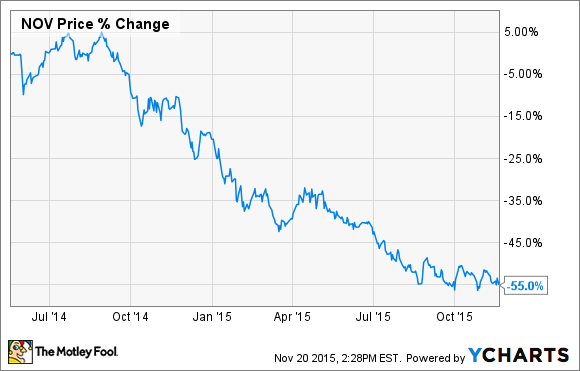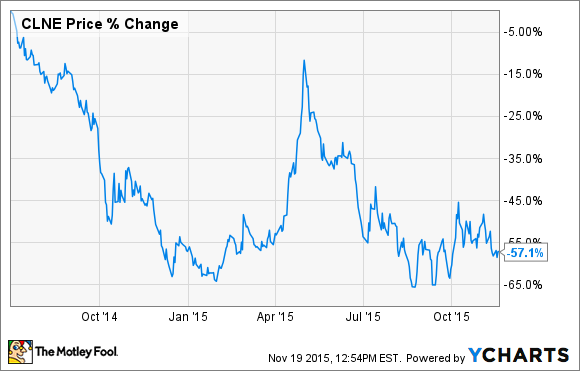The entire energy sector has a walloping by Mr. Market ever since oil prices started declining more than a year ago. While there are plenty of companies that probably deserved to get knocked down a few rungs because of questionable finances and less robust business models, the decline has taken many companies that don't necessarily deserve it with the rest.
So we asked three of our energy contributors to highlight a stock they think has been unjustly dragged down in the energy market sell-off. Here's what they had to say.
Tyler Crowe: I can sympathize with some investors that have concerns about National Oilwell Varco (NOV 1.35%). Its backlog or work has been on the decline for more than a year and there doesn't appear to be any signs of rig demand picking up any time soon. That said, I think that investors are missing the fact that this company is wildly undervalued.
The first thing to consider here is that demand for rigs is a lumpy business. Rig owners tend to get overambitious in the good times and buy a bunch of new rigs, only to find themselves oversupplied for a couple of years. That doesn't mean the demand for rigs will completely go away, though. To meet oil and gas demand in the coming years, offshore drilling and production will continue to be a major piece of the puzzle and we will need new rigs to replace older equipment and accommodate expanding demand.
What else is important to understand about NOV is that the company has some other business segments upon which it can lean during the tougher times for rigs. Not only does its rig afgermarket segment help produce a more consistent stream of high margin parts to the industry, but National Oilwell Varco is also making a big push into the Floating Production, Storage, and Offloading ships. The more and more we see offshore development take hold, the greater the demand we will see for these vessels.
Demand for National Oiwell Varco's bread and butter business segment may be weak today, but its hard to see how a cyclical downturn would be enough to cut National Oilwell Vaco's entire market value by more than half.
With a strong balance sheet and a dividend yield close to 5%, it sure seems like the market is overreacting and it may be time for long term investors to consider putting National Oilwell Varco on their radar.
Matt DiLallo: Enterprise Products Partners (EPD 1.41%) is down more than 28% this year. It's a plunge that is simply mindboggling for two big reasons. First, Enterprise's cash flow is about as steady as one will find. And, second, its financials are among the strongest in the energy sector.
This year's beating comes despite the fact that more than 80% of the company's cash flow is fee-based leaving it relatively unexposed to commodity price volatility. We see the impact of this on the chart in the upper right-hand corner of the slide below.

Source: Enterprise Products Partners Investor Presentation.
Notice that despite significant oil prices volatility over the past decade Enterprise's gross operating margin and distributable cash flow have both trudged higher. This is where the focus on owning fee-based assets has provided significant stability throughout the commodity price cycle.
Then of course is the fact that Enterprise has one of the strongest set of financials in the sector. It boasts of one of the highest credit ratings among MLPs and a robust distribution coverage ratio that has averaged 1.4 times over the past five years, including through the first six months of this year. That strong coverage ratio is also coming on an ever increasing distribution with Enterprise Products Partners having increased its distribution for 45 consecutive quarters.
The distribution is also likely to continue to head higher because Enterprise currently has $8 billion in projects under construction. These projects are expected to deliver more fee-based cash flow, which is the key to distribution growth. Further, a growing portion of its growth is demand driven and not supply driven, which is key during a time when low commodity prices are fueling demand growth while muting supply growth.
The bottom line here is the simple fact that Enterprise has been unfairly beaten down by the market, which is selling off anything energy-related. This is a company whose cash flow is largely immune to commodity price volatility. Instead, its cash flow and distribution are likely heading higher, which eventually will grab the market's attention.
Jason Hall: It's hard to make the case that a company which is losing money has been "unfairly" beaten down, but I think that's happened with Clean Energy Fuels (CLNE -0.89%).
Clean Energy's business is:
- Selling natural gas for transportation, and operating/maintaining the stations.
- Building stations for its customers.
- Manufacturing compression equipment for natural gas.
While the second two parts of its business are important, they are secondary to selling fuel, which is a recurring revenue business (most of the vehicles it services operate for five to 10 years or longer) while the station building and compressor manufacturing business, are cyclical and "lumpy", and exist to facilitate growth in fuel sales.
To the point: Clean Energy Fuels' stock price has done this since oil prices started falling in June 2014:
In a vacuum, this makes sense, since cheap diesel and gasoline reduces the "spread" between natural gas and those fuels, making it less financially compelling for fleet operators to invest in natural gas vehicles. And for a company like Clean Energy, which is burning cash after taking on a lot of debt to fund capital expansion, that's not a good thing to have happen.
Image Source: Clean Energy Fuels corporate website
But in reality, the business keeps growing. Clean Energy has consistently reported double-digit growth in fuel deliveries as key industries like refuse hauling and transit continue to replace diesel with natural gas. Heavy trucking -- which is a massive 40 billion gallon per-year market -- continues to show life, with sales to this segment up 13% last quarter.
At the same time, the company has cut sales, general, & administrative expense about 15% since the start of 2014, and also maintained its fuel margins. Last quarter, the company reported $0.26 per gallon, versus $0.28 per gallon a year ago. Capital expenditures are also down by half, as the company slows its pace of expansion and simply gets the benefit of increased utilization to drive growth.
Between reduced operating and capital expense, growing fuel volumes, and steady margins, today's Clean Energy is a better business than it was when oil was $100 per barrel. But a market that's fearful of all things oil and gas isn't seeing that.






